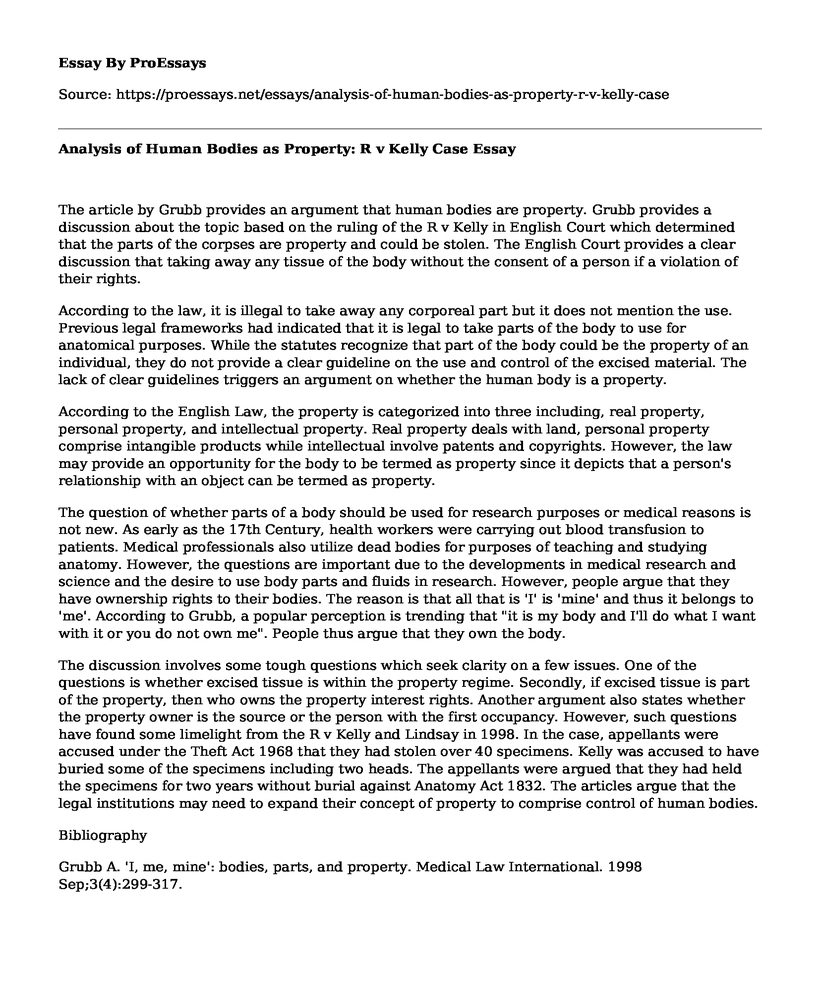The article by Grubb provides an argument that human bodies are property. Grubb provides a discussion about the topic based on the ruling of the R v Kelly in English Court which determined that the parts of the corpses are property and could be stolen. The English Court provides a clear discussion that taking away any tissue of the body without the consent of a person if a violation of their rights.
According to the law, it is illegal to take away any corporeal part but it does not mention the use. Previous legal frameworks had indicated that it is legal to take parts of the body to use for anatomical purposes. While the statutes recognize that part of the body could be the property of an individual, they do not provide a clear guideline on the use and control of the excised material. The lack of clear guidelines triggers an argument on whether the human body is a property.
According to the English Law, the property is categorized into three including, real property, personal property, and intellectual property. Real property deals with land, personal property comprise intangible products while intellectual involve patents and copyrights. However, the law may provide an opportunity for the body to be termed as property since it depicts that a person's relationship with an object can be termed as property.
The question of whether parts of a body should be used for research purposes or medical reasons is not new. As early as the 17th Century, health workers were carrying out blood transfusion to patients. Medical professionals also utilize dead bodies for purposes of teaching and studying anatomy. However, the questions are important due to the developments in medical research and science and the desire to use body parts and fluids in research. However, people argue that they have ownership rights to their bodies. The reason is that all that is 'I' is 'mine' and thus it belongs to 'me'. According to Grubb, a popular perception is trending that "it is my body and I'll do what I want with it or you do not own me". People thus argue that they own the body.
The discussion involves some tough questions which seek clarity on a few issues. One of the questions is whether excised tissue is within the property regime. Secondly, if excised tissue is part of the property, then who owns the property interest rights. Another argument also states whether the property owner is the source or the person with the first occupancy. However, such questions have found some limelight from the R v Kelly and Lindsay in 1998. In the case, appellants were accused under the Theft Act 1968 that they had stolen over 40 specimens. Kelly was accused to have buried some of the specimens including two heads. The appellants were argued that they had held the specimens for two years without burial against Anatomy Act 1832. The articles argue that the legal institutions may need to expand their concept of property to comprise control of human bodies.
Bibliography
Grubb A. 'I, me, mine': bodies, parts, and property. Medical Law International. 1998 Sep;3(4):299-317.
Cite this page
Analysis of Human Bodies as Property: R v Kelly Case. (2023, Jul 04). Retrieved from https://proessays.net/essays/analysis-of-human-bodies-as-property-r-v-kelly-case
If you are the original author of this essay and no longer wish to have it published on the ProEssays website, please click below to request its removal:
- Green Roof and Thermal Performance: Articles Review Example
- Human Nutrition - Presentation Example on Public Health
- Research Paper on Jean Watson`s Nursing Theory
- Paper Example on Epidemiology: Incidence and Prevalence of HIV/AIDS in Network City
- Reflection Paper: The Plague of Athens
- Essay Sample on Population Health: Factors Determining Health Outcomes & Strategies for Improvement
- Paper Sample on Role of ZP Glycoproteins in Women's Fertility







